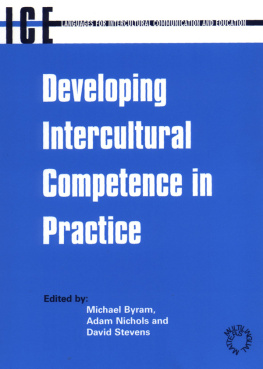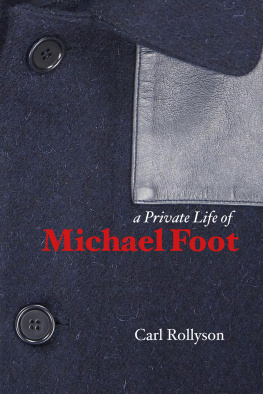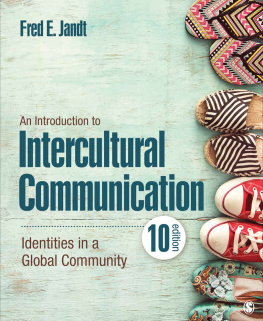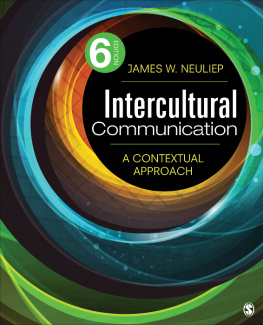Byram Prof. Michael - Developing Intercultural Competence in Practice
Here you can read online Byram Prof. Michael - Developing Intercultural Competence in Practice full text of the book (entire story) in english for free. Download pdf and epub, get meaning, cover and reviews about this ebook. year: 2001, publisher: Channel View Publications, genre: Religion. Description of the work, (preface) as well as reviews are available. Best literature library LitArk.com created for fans of good reading and offers a wide selection of genres:
Romance novel
Science fiction
Adventure
Detective
Science
History
Home and family
Prose
Art
Politics
Computer
Non-fiction
Religion
Business
Children
Humor
Choose a favorite category and find really read worthwhile books. Enjoy immersion in the world of imagination, feel the emotions of the characters or learn something new for yourself, make an fascinating discovery.
- Book:Developing Intercultural Competence in Practice
- Author:
- Publisher:Channel View Publications
- Genre:
- Year:2001
- Rating:3 / 5
- Favourites:Add to favourites
- Your mark:
- 60
- 1
- 2
- 3
- 4
- 5
Developing Intercultural Competence in Practice: summary, description and annotation
We offer to read an annotation, description, summary or preface (depends on what the author of the book "Developing Intercultural Competence in Practice" wrote himself). If you haven't found the necessary information about the book — write in the comments, we will try to find it.
Developing Intercultural Competence in Practice — read online for free the complete book (whole text) full work
Below is the text of the book, divided by pages. System saving the place of the last page read, allows you to conveniently read the book "Developing Intercultural Competence in Practice" online for free, without having to search again every time where you left off. Put a bookmark, and you can go to the page where you finished reading at any time.
Font size:
Interval:
Bookmark:
Languages for Intercultural Communication and Education
Editors: Michael Byram, University of Durham, UK
and Alison Phipps, University of Glasgow, UK
The overall aim of this series is to publish books which will ultimately inform learning and teaching, but whose primary focus is on the analysis of intercultural relationships, whether in textual form or in peoples experience. There will also be books which deal directly with pedagogy, with the relationships between language learning and cultural learning, between processes inside the classroom and beyond. They will all have in common a concern with the relationship between language and culture, and the development of intercultural communicative competence.
Other Books of Interest
Foreign Language and Culture Learning from a Dialogic Perspective Carol Morgan and Albane Cain
The Good Language Learner N. Naiman, M. Frhlich, H.H. Stern and A. Todesco
Language, Culture and Communication in Contemporary Europe Charlotte Hoffman (ed.)
Language Learners as Ethnographers
Celia Roberts, Michael Byram, Ana Barro, Shirley Jordan and Brian Street
Language Teachers, Politics and Cultures
Michael Byram and Karen Risager
Motivating Language Learners
Gary N. Chambers
New Perspectives on Teaching and Learning Modern Languages
Simon Green (ed.)
Teaching and Assessing Intercultural Communicative Competence
Michael Byram
Please contact us for the latest book information:
Multilingual Matters, Frankfurt Lodge, Clevedon Hall,
Victoria Road, Clevedon, BS21 7HH, England
http://www.multilingual-matters.com
LANGUAGES FOR INTERCULTURAL
COMMUNICATION AND EDUCATION 1
Series Editors: Michael Byram and Alison Phipps
Developing Intercultural
Competence in Practice
Edited by
Michael Byram, Adam Nichols
and David Stevens
MULTILINGUAL MATTERS LTD
Clevedon Buffalo Toronto Sydney
Library of Congress Cataloging in Publication Data
Developing Intercultural Competence in Practice/Edited by Michael Byram, Adam
Nichols and David Stevens
Includes bibliographical references and index.
1. Intercultural communicationStudy and teaching. 2. Multicultural education.
3. Language and languagesStudy and teaching. I. Byram, Michael.
II. Nichols, Adam, III. Stevens, David
P94.6.D48 2001
370.117dc21 2001030233
British Library Cataloguing in Publication Data
A catalogue entry for this book is available from the British Library.
ISBN 1-85359-537-3 (hbk)
ISBN 1-85359-536-5 (pbk)
Multilingual Matters Ltd
UK: Frankfurt Lodge, Clevedon Hall, Victoria Road, Clevedon BS21 7HH.
USA: UTP, 2250 Military Road, Tonawanda, NY 14150, USA.
Canada: UTP, 5201 Dufferin Street, North York, Ontario M3H 5T8, Canada.
Australia: Footprint Books, Unit 4/92a Mona Vale Road, Mona Vale, NSW 2103, Australia.
Copyright 2001 Michael Byram, Adam Nichols, David Stevens and the authors of individual chapters.
All rights reserved. No part of this work may be reproduced in any form or by any means without permission in writing from the publisher.
Typeset by Exe Valley Dataset Ltd, Exeter, England.
Printed and bound in Great Britain by the Cromwell Press Ltd.
Alison Phipps
Michael Byram, Adam Nichols and David Stevens
Beginners
Carol Morgan
Intermediate
Eva Burwitz-Melzer
Elena Tarasheva and Leah Davcheva
Advanced
Maria Metodieva Genova
Iskra Georgieva
Sylvia Duffy and Janet Mayes
Mary Williams
Using New Technologies
Lynne Parmenter and Yuichi Tomita
Sheila Carel
Clare Dodd
Paul Whittaker
In the Field
Jane Woodin
Judith Parsons and Peter Junge
Leon Aktor and Karen Risager
Tanya Madjarova, Magdalena Botsmanova and Tanya Stamatova
Krassimira Topuzova
Franoise Vigneron
This book fits with several aims of the book series Languages, Intercultural Communication and Education, most notably to provide studies of culture acquisition in pedagogical surroundings and to show how language teaching and learning can be structured and their methods developed.
Like many of the publications that are emerging in the field of Languages and Intercultural Communication, this book is both ambitious and unusual. It is not a traditional academic text, nor is it a textbook full of tips and tricks for teachers. It covers the full formal educational range from beginners to trainee teachers, as well as examining resources and new technologies that take learners beyond the classroom. It is not intended as an academic text, although it is written by academics and teachers. Instead it provides a forum for reflection on the experience and practice of learning and teaching languages and intercultural competence. As such it is packed with inspiring and helpfully laid-out examples and descriptions of good, innovative practice from an impressive number of cultures and languages. This book will, I believe, be an invaluable resource for practitioners, who will recognise that there is nonetheless some important theoretical thinking implicit in the practices described.
One of the most striking aspects of the contributions to this project is the fact that, despite the different languages and cultures examined and the different provenance of the contributors, there is a common enthusiasm and excitement regarding intercultural discoveries made with learners, despite the often fraught practicalities that classroom situations and formal educational requirements can impose on innovative ideas. The reflections by teachers and learners have a freshness that is not overly constrained by theoretical reflection, ethical dilemmas or formal educational concerns. Rather the articles share an ability to leave memorable descriptions of learning experiences behind in the mind of the reader. To read this book is to discover whole new worlds of possibility that Languages and Intercultural Communication in practice is opening up world-wide and to be privileged to share in the first discoveries that these brave, even rash explorers have made. The mountains of Bulgaria, the care for the elderly in Denmark, the motivation of demotivated learners through technology, the excitement of virtual dialogue, the understanding of other geographies, the reading of literature, Christmas cards and visual media in new ways all open up possibilities for the learning and teaching of languages and intercultural communicative competence.
Intercultural communicative practice is a messy business. It involves much trial and error, according to these accounts. It does not fit neatly into a schema but it does have encouraging and stimulating stories to tell. The successes of these examples of good and innovative practice are not produced in ideal conditions, with large budgets or by genius teachers with eager learners. They are produced in hard and often difficult material circumstances that beset some educational systems, or in the time constraints that accompany adult learners, or in socially deprived areas that do not necessarily prioritise language learning. And they are produced by practitioners who have themselves developed intercultural communicative competence and have engaged directly with teachers and learners in and of other languages and cultures. The descriptions of intercultural practice have the potential to inspire and to provide support for those developing teaching in the field of Languages and Intercultural Communication.
Next pageFont size:
Interval:
Bookmark:
Similar books «Developing Intercultural Competence in Practice»
Look at similar books to Developing Intercultural Competence in Practice. We have selected literature similar in name and meaning in the hope of providing readers with more options to find new, interesting, not yet read works.
Discussion, reviews of the book Developing Intercultural Competence in Practice and just readers' own opinions. Leave your comments, write what you think about the work, its meaning or the main characters. Specify what exactly you liked and what you didn't like, and why you think so.





